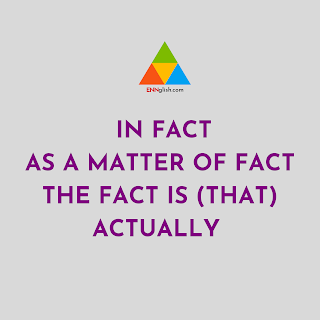Understanding “In Fact” and Related Expressions
To develop a previous statement, you usually use “in fact” or “as a matter of fact”:
The winter of 1940 was very bad. In fact, most people say it was the worst winter they had ever experienced.
Sachin doesn’t like his new job. As a matter of fact, he’s thinking of leaving.
Do Not Use:
“in fact” or “as a matter of fact” should not be used in general or introductory statements:
In the last two decades, advances in technology have changed the face of industry. (NOT ‘have in fact changed’)
To Correct What Someone Thinks or Supposes:
Use “in fact,” “as a matter of fact,” or “actually”:
‘He’s a friend of yours, isn’t he?’ ‘No, he isn’t. As a matter of fact, I’ve just met him.’
‘People think they’ve got lots of money, but in fact they’re quite poor.’
‘I’m sorry to have kept you waiting.’ ‘Well, actually I’ve only just arrived.’
Use “The Fact Is (That)” To Introduce Your Main Point:
Use “the fact is (that)” to introduce your main point, especially when this explains the real truth about a particular situation:
‘I’m not surprised that he’s looking worried. The fact is (that) he’s been spending more than he earns.’
‘We don’t really want to go, but the fact is (that) we don’t have any choice.’
Accept/Appreciate the Fact That …
Accept or appreciate the fact that … (NOT agree to/with the fact that …):
‘I appreciate the fact that funds are limited.’

